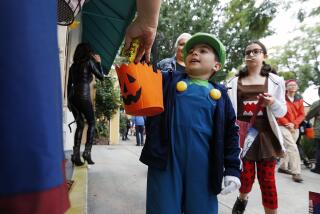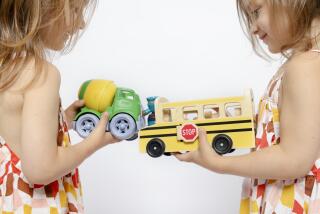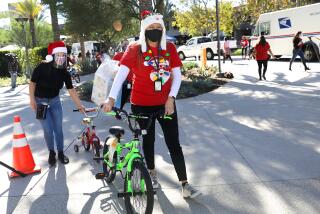How to make sure you’re giving safe toys
- Share via
It’s primetime for toy-buying. But how to do you know that what you’re putting under the tree isn’t putting the kids you love in danger?
ShopSmart magazine offers strategies to make sure your holiday gifts are free of lead and other dangers:
1. Know what toys to avoid. Steer clear of no-name toys and, regardless of your child’s age, don’t buy toys with small magnets, even if the magnets seem safely contained within the toy. Don’t buy metal jewelry, especially the cheap stuff, for young children or allow them to play with key chains or items with metal charms. If you have an infant or toddler who still puts almost everything in her mouth, don’t buy squeezable soft plastic toys or books. Unless it says “no phthalates” on the package, there’s no way of knowing if they contain the chemical or not.
2. Buy according to a kid’s age. Look for manufacturer’s recommended age ranges on toy packaging. Age grading is more than a friendly hint. It can alert you to a possible choking hazard, the presence of small parts, and other dangers. And think twice before buying a toy with small parts for a child older than 3 who has a younger sibling. Keep all small round or oval objects, including coins, balls, and marbles, away from kids under 3.
3. Check for recalls. Before shopping, go to www.cpsc.gov, a government Web site, to see whether the toys you plan to buy (and the toys already in your home) have been recalled. You can also sign up for free e-mail notices of recalls at the site. And if a product you buy comes with a registration card, fill it out and send it in so you will be notified directly by the manufacturer if the item is recalled. It’s up to retailers to take recalled toys off store shelves but, once a recalled toy is in your home, it’s up to you to keep it away from your family or return it ASAP.
4. Watch where you shop. Be leery of drugstores, airports and dollar stores. They’ve been known to carry flimsy plastic toys with dangerous sharp edges or small parts that can break off easily. Thrift stores, consignment shops, yard and garage sales, and eBay often have toys in excellent condition, but check to see that they’re well made and have no small magnets or parts. Wash the toys before giving them.
More to Read
Sign up for The Wild
We’ll help you find the best places to hike, bike and run, as well as the perfect silent spots for meditation and yoga.
You may occasionally receive promotional content from the Los Angeles Times.










